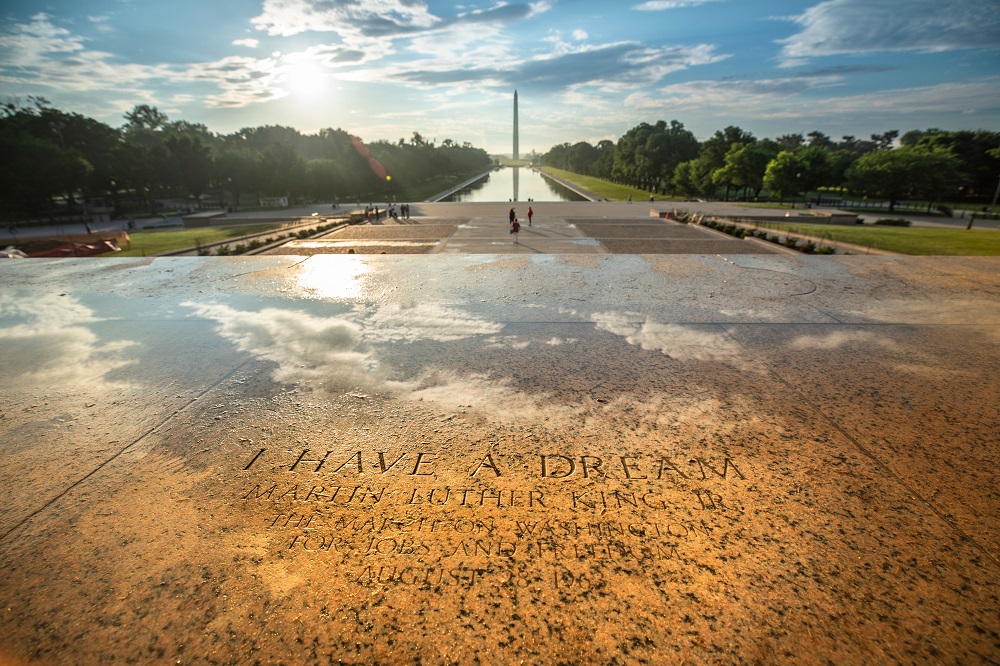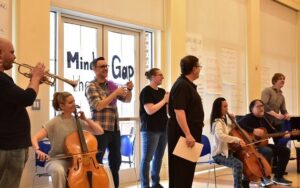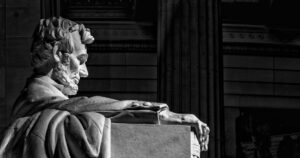I started volunteering with Braver Angels originally in the fall of 2017. It was less than a year after the 2016 election, maybe the most polarizing in American history. I had seen a lot in American politics. But I could hardly have anticipated the things that were to come.
We are seeing things in American political life today that are not normal. On Thursday, former President Donald Trump was arrested and booked in Fulton County, GA on charges that he sought to overturn the election results in that state. Trump has already been federally indicted on charges that he attempted to do so across the country (alongside a separate federal indictment and one in New York state).
At a gathering highlighted by the anti-Trump Republican group The Lincoln Project a crowd of hundreds erupted in furious celebration as CNN released the mugshot of the former president, glaring grimly into the camera. President Biden, when asked about the photo, remarked with dark humor that Trump was a “handsome” guy. Many will have read satisfaction in the president’s voice.
Yet even as enemies of Trump celebrated, the image inspired renewed devotion in the former president’s supporters. Memes highlighting the image of the president as a persecuted yet undaunted champion of the people are proliferating across the internet. Never before has a photograph proved so instantly iconic. In an era in which the popular credibility of our justice department and our mainstream press has never been lower Trump’s arrest stands to many as a badge of honor.
It is Trump, for many, who stands between us and an authoritarian state. “In the end, they’re not coming after me,” Donald Trump reminded his followers in a defiant speech after the arrest. “They’re coming after you — and I’m just standing in their way.”
These events are not normal. And yet that is a relative statement. For young Americans, this turn in our politics is normal.
If you were born in 1997 (the beginning of generation “Z”) you may well remember a moment full of hope, for most Americans, in the election of President Barack Obama in 2008. You were 11 years old.
America’s first African-American president running on an inspiring platform of unity and reconciliation, Obama tapped into the desire of Americans to transcend the bitterness of our partisan and cultural divides with a message of “hope and change.”
By the time of his re-election campaign, when you were 15, you may well have felt that all such talk of hope and change had been a farce.
You may have blamed different parties, of course, or heard your parents and others doing so. Some said the Tea Party and congressional Republicans proved there was no making peace with the other side. Others claimed that Barack Obama showed himself to be a divisive radical who preyed on the idealism of the American people to gain power.
Either way the idea of hope and change, for most Americans, was already dead by 2012.
Your first opportunity to vote in a presidential election came when you were 19. In 2016 you were given a historically bitter contest between perhaps the two most unpopular presidential nominees in history: Hillary Clinton and Donald Trump.
Allegations of collusion with Russia to interfere with our election on his behalf surrounded Trump. Outrage over alleged falsifying of salacious stories about Trump and Russia joined with derision over Secretary of State Clinton’s alleged mishandling of classified emails.
Hillary Clinton lost that election while winning the popular vote. Protestors jammed highways in grievous indignation. The legitimacy of Trump’s election was immediately challenged, ultimately culminating in an impeachment that failed to remove him from office.
President Trump officially lost the 2020 election, but launched a massive effort to investigate, denounce and challenge its results. This effort ended with the storming of Capitol Hill (whether one blamed the president for this or not) by hundreds of Trump’s supporters and a final impeachment that also failed to see his removal.
You are now 26 years old. You have never had the opportunity to vote in a presidential election where the results and the candidates were overwhelmingly accepted as legitimate. You are not likely to get that chance in 2024.
Yet and still, I write you on the eve of the 60th anniversary of Dr. Martin Luther King Jr.’s I Have a Dream speech, delivered at the March on Washington near the apex of the Civil Rights Movement.
In challenging injustices that had stood for hundreds of years, Dr. King and his followers beckoned Americans across the spectrum of race and politics to remember the better angels of their nature in the interests of saving justice and equality in American society.
In mighty ways they succeeded. And their challenge was not necessarily less daunting than our own.
“Our experience as a country reminds us that we are capable of overcoming the mightiest of obstacles.”
Our experience as a country reminds us that we are capable of overcoming the mightiest of obstacles. We can overcome these as well. But whatever your politics, we cannot do it by sinking ever further into the culture of dishonesty and demonization that got us here.
In the words of King: “In the process of gaining our rightful place, we must not be guilty of wrongful deeds. Let us not seek to satisfy our thirst for freedom by drinking from the cup of bitterness and hatred.”
The Civic Renewal Movement is galvanizing the American people to restore trust in one another, and from this to challenge our leaders and institutions to serve their function and cease inflaming the tribal breakdown of our country.
This battle is a daunting one. But history reminds us that hope will not be denied. No challenge is too great for an American people that remembers her capacity for redemption and unity.
This is the work of Braver Angels. Let us commit to it together.




